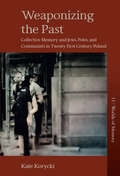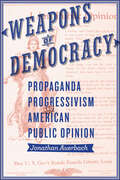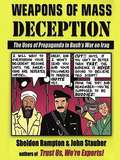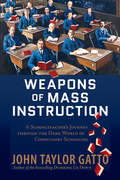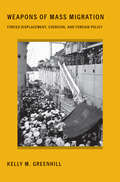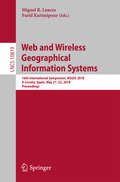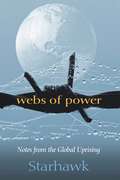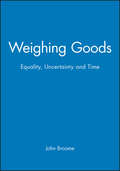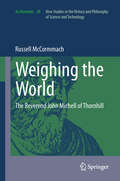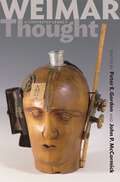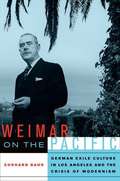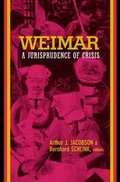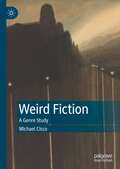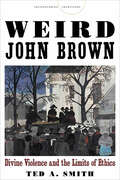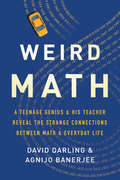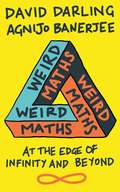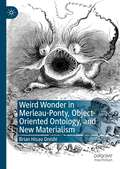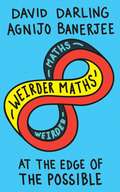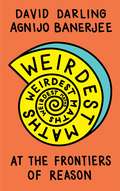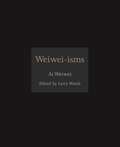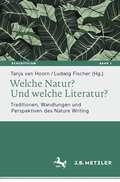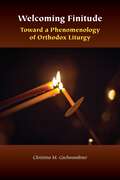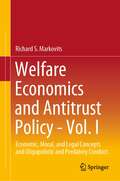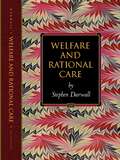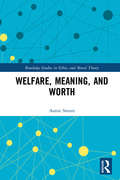- Table View
- List View
Weaponizing the Past: Collective Memory and Jews, Poles, and Communists in Twenty-First Century Poland (Worlds of Memory #11)
by Kate KoryckiIn Poland, contemporary political actors have constructed a narrative of Polish history since 1989 in which Polish and Jewish involvement with communism has created a national concept of “we.” Weaponizing the Past explores the resulting implications of national belonging through a lens of collective memory. Taking a constructivist approach to electoral politics and nation making in Poland’s past, this volume’s dual line of inquiry articulates why and how elites politicize the past, what effect this politicization produces, and contextualizes this politicization to illustrate contemporary production of anti-Semitism.
Weapons of Democracy: Propaganda, Progressivism, and American Public Opinion (New Studies in American Intellectual and Cultural History)
by Jonathan AuerbachHow and why did public opinion—long cherished as a foundation of democratic government—become an increasing source of concern for American Progressives?Following World War I, political commentator Walter Lippmann worried that citizens increasingly held inaccurate and misinformed beliefs because of the way information was produced, circulated, and received in a mass-mediated society. Lippmann dubbed this manipulative opinion-making process "the manufacture of consent." A more familiar term for such large-scale persuasion would be propaganda. In Weapons of Democracy, Jonathan Auerbach explores how Lippmann’s stark critique gave voice to a set of misgivings that had troubled American social reformers since the late nineteenth century.Progressives, social scientists, and muckrakers initially drew on mass persuasion as part of the effort to mobilize sentiment for their own cherished reforms, including regulating monopolies, protecting consumers, and promoting disinterested, efficient government. "Propaganda" was associated with public education and consciousness raising for the good of the whole. By the second decade of the twentieth century, the need to muster support for American involvement in the Great War produced the Committee on Public Information, which zealously spread the gospel of American democracy abroad and worked to stifle dissent at home. After the war, public relations firms—which treated publicity as an end in itself—proliferated.Weapons of Democracy traces the fate of American public opinion in theory and practice from 1884 to 1934 and explains how propaganda continues to shape today’s public sphere. The book closely analyzes the work of prominent political leaders, journalists, intellectuals, novelists, and corporate publicists, including Woodrow Wilson, Theodore Roosevelt, Mark Twain, George Creel, John Dewey, Julia Lathrop, Ivy Lee, and Edward Bernays. Truly interdisciplinary in both scope and method, this book will appeal to students and scholars in American studies, history, political theory, media and communications, and rhetoric and literary studies.
Weapons of Mass Deception: The Uses of Propaganda in Bush's War on Iraq
by Sheldon Rampton John StauberWeapons of Mass Deception reveals: How the Iraq war was sold to the American public through professional P.R. strategies. "The First Casualty": Lies that were told related to the Iraq war. Euphemisms and jargon related to the Iraq war, e.g. "shock and awe," "Operation Iraqi Freedom," "axis of evil," "coalition of the willing," etc. <P><P>"War as Opportunity": How the war on terrorism and the war on Iraq have been used as marketing hooks to sell products and policies that have nothing to do with fighting terrorism. "Brand America": The efforts of Charlotte Beers and other U.S. propaganda campaigns designed to win hearts overseas. "The Mass Media as Propaganda Vehicle": How news coverage followed Washington's lead and language. <P>The book includes a glossary -- "Propaganda: A User's Guide" -- and resources to help Americans sort through the deceptions to see the strings behind Washington's campaign to sell the Iraq war to the public.
Weapons of Mass Instruction
by John Taylor GattoJohn Taylor Gatto's Weapons of Mass Instruction, now available in paperback, focuses on mechanisms of traditional education that cripple imagination, discourage critical thinking, and create a false view of learning as a byproduct of rote-memorization drills. Gatto's earlier book, Dumbing Us Down, introduced the now-famous expression of the title into the common vernacular. Weapons of Mass Instruction adds another chilling metaphor to the brief against conventional schooling. Gatto demonstrates that the harm school inflicts is rational and deliberate. The real function of pedagogy, he argues, is to render the common population manageable. To that end, young people must be conditioned to rely upon experts, to remain divided from natural alliances, and to accept disconnections from their own lived experiences. They must at all costs be discouraged from developing self-reliance and independence. Escaping this trap requires strategy Gatto calls "open source learning" which imposes no artificial divisions between learning and life. Through this alternative approach, our children can avoid being indoctrinated--only then that can they achieve self-knowledge, judgment, and courage.
Weapons of Mass Migration: Forced Displacement, Coercion, and Foreign Policy
by Kelly M. GreenhillAt first glance, the U.S. decision to escalate the war in Vietnam in the mid-1960s, China's position on North Korea's nuclear program in the late 1990s and early 2000s, and the EU resolution to lift what remained of the arms embargo against Libya in the mid-2000s would appear to share little in common. Yet each of these seemingly unconnected and far-reaching foreign policy decisions resulted at least in part from the exercise of a unique kind of coercion, one predicated on the intentional creation, manipulation, and exploitation of real or threatened mass population movements.In Weapons of Mass Migration, Kelly M. Greenhill offers the first systematic examination of this widely deployed but largely unrecognized instrument of state influence. She shows both how often this unorthodox brand of coercion has been attempted (more than fifty times in the last half century) and how successful it has been (well over half the time). She also tackles the questions of who employs this policy tool, to what ends, and how and why it ever works. Coercers aim to affect target states' behavior by exploiting the existence of competing political interests and groups, Greenhill argues, and by manipulating the costs or risks imposed on target state populations.This "coercion by punishment" strategy can be effected in two ways: the first relies on straightforward threats to overwhelm a target's capacity to accommodate a refugee or migrant influx; the second, on a kind of norms-enhanced political blackmail that exploits the existence of legal and normative commitments to those fleeing violence, persecution, or privation. The theory is further illustrated and tested in a variety of case studies from Europe, East Asia, and North America. To help potential targets better respond to-and protect themselves against-this kind of unconventional predation, Weapons of Mass Migration also offers practicable policy recommendations for scholars, government officials, and anyone concerned about the true victims of this kind of coercion-the displaced themselves.
Web and Wireless Geographical Information Systems: 16th International Symposium, W2GIS 2018, A Coruña, Spain, May 21–22, 2018, Proceedings (Lecture Notes in Computer Science #10819)
by Miguel R. Luaces Farid KarimipourThis book constitutes the refereed proceedings of the 16th International Symposium on Web and Wireless Geographical Information Systems, W2GIS 2018, held in A Coruña, Spain, in May 2018. The 15 full papers included in the volume were carefully reviewed and selected from 20 submissions. They deal with theoretical, technical, and practical issues in the field of wireless and Internet technologies suited for the dissemination, usage, and processing of geo-referenced data.
Webs of Power
by StarhawkWriting from the front lines, Starhawk chronicles the global justice movement sparked by Seattle's 1999 anti-World Trade Organization protest. A life-long activist, Starhawk is deeply involved as a direct action participant and trainer in the antiglobalization movement.The book is divided into "Actions" and "Visions." In Part I, Starhawk begins with an overview of the complex political and economic powers that the antiglobalization movement opposes. Then, recounting the blow-by-blow events of the critical confrontations faced by the antiglobalization protestors--from Seattle to Genoa--Starhawk discusses police brutality, the Black Bloc versus the pacifists, and the magic of solidarity.In Part II, Starhawk spins a vision of the future of the antiglobalization movement. Drawing on her twenty years of experience as an activist, ecofeminist, and witch, she explores the debate between violent and nonviolent tactics; the definition of an economy of true abundance; and how we can transform our rage and despair, face our fears, and renew our spirits while acting to change the world.Starhawk is the author or coauthor of eight books, including The Twelve Wild Swans: Journeys Into Magic, Healing and Action (HarperSanFrancisco, 2000); the Twentieth Anniversary Edition of The Spiral Dance (HarperSanFrancisco, 1999); and Circle Round: Raising Children in the Goddess Tradition (Bantam, 1998). Well-known in the Wiccan and Pagan Community, Starhawk is a columnist on the web for beliefnet.com and for znet. She lives in San Francisco.Marketing Plans: * Bookstore events and publicity in San Francisco. * Nationwide radio interviews. * National print feature and review campaign. * Web publicity on anti-globalization sites. * Ads in Z Magazine, The Progressive, The Nation, Utne Reader, Mother Jones, PanGaia, Reclaiming. * Course adoption campaign.Also Available Global Uprising: Confronting the Tyrannies of the 21st Century TP $19.95, 0-86571-446-0 * USA
Weighing Goods: Equality, Uncertainty and Time
by John BroomeThis study uses techniques from economics to illuminate fundamental questions in ethics, particularly in the foundations of utilitarianism. Topics considered include the nature of teleological ethics, the foundations of decision theory, the value of equality and the moral significance of a person's continuing identity through time.
Weighing the World
by Russell MccormmachThe book about John Michell (1724-93) has two parts. The first and longest part is biographical, an account of Michell's home setting (Nottinghamshire in England), the clerical world in which he grew up (Church of England), the university (Cambridge) where he studied and taught, and the scientific activities he made the center of his life. The second part is a complete edition of his known letters. Half of his letters have not been previously published; the other half are brought together in one place for the first time. The letters touch on all aspects of his career, and because they are in his words, they help bring the subject to life. His publications were not many, a slim book on magnets and magnetism, one paper on geology, two papers on astronomy, and a few brief papers on other topics, but they were enough to leave a mark on several sciences. He has been called a geologist, an astronomer, and a physicist, which he was, though we best remember him as a natural philosopher, as one who investigated physical nature broadly. His scientific contribution is not easy to summarize. Arguably he had the broadest competence of any British natural philosopher of the eighteenth century: equally skilled in experiment and observation, mathematical theory, and instruments, his field of inquiry was the universe. From the structure of the heavens through the structure of the Earth to the forces of the elementary particles of matter, he carried out original and far-reaching researches on the workings of nature.
Weimar Thought: A Contested Legacy
by Peter E. Gordon and John P. McCormickA comprehensive look at the intellectual and cultural innovations of the Weimar periodDuring its short lifespan, the Weimar Republic (1918–33) witnessed an unprecedented flowering of achievements in many areas, including psychology, political theory, physics, philosophy, literary and cultural criticism, and the arts. Leading intellectuals, scholars, and critics—such as Hannah Arendt, Walter Benjamin, Ernst Bloch, Bertolt Brecht, and Martin Heidegger—emerged during this time to become the foremost thinkers of the twentieth century. Even today, the Weimar era remains a vital resource for new intellectual movements. In this incomparable collection, Weimar Thought presents both the specialist and the general reader a comprehensive guide and unified portrait of the most important innovators, themes, and trends of this fascinating period.The book is divided into four thematic sections: law, politics, and society; philosophy, theology, and science; aesthetics, literature, and film; and general cultural and social themes of the Weimar period. The volume brings together established and emerging scholars from a remarkable array of fields, and each individual essay serves as an overview for a particular discipline while offering distinctive critical engagement with relevant problems and debates.Whether used as an introductory companion or advanced scholarly resource, Weimar Thought provides insight into the rich developments behind the intellectual foundations of modernity.
Weimar on the Pacific: German Exile Culture in Los Angeles and the Crisis of Modernism
by Ehrhard BahrIn the 1930s and 40s, Los Angeles became an unlikely cultural sanctuary for a distinguished group of German artists and intellectuals - including Thomas Mann, Theodor W. Adorno, Bertolt Brecht, Fritz Lang, and Arnold Schoenberg - who were fleeing Nazi Germany. This book examines as a group the work and lives of these artists and intellectuals.
Weimar: A Jurisprudence of Crisis
by Bernhard Schlink Arthur J. JacobsonThis selection of the major works of constitutional theory during the Weimar period reflects the reactions of legal scholars to a state in permanent crisis, a society in which all bets were off.
Weird Fiction: A Genre Study
by Michael CiscoWeird Fiction: A Genre Study presents a comprehensive, contemporary analysis of the genre of weird fiction by identifying the concepts that influence and produce it. Focusing on the sources of narrative content—how the content is produced and what makes something weird—Michael Cisco engages with theories from Deleuze and Guattari to explain how genres work and to understand the relationship between identity and the ordinary. Cisco also uses these theories to examine the supernatural not merely as a horde of tropes, but as a recognition of the infinity of experience in defiance of limiting norms. The book also traces the sociopolitical implications of weird fiction, studying the differentiation of major and minor literatures. Through an articulated theoretical model and close textual analysis, readers will learn not only what weird fiction is, but how and why it is produced.
Weird John Brown: Divine Violence and the Limits of Ethics (Encountering Traditions)
by Ted A. SmithConventional wisdom holds that attempts to combine religion and politics will produce unlimited violence. Concepts such as jihad, crusade, and sacrifice need to be rooted out, the story goes, for the sake of more bounded and secular understandings of violence. Ted Smith upends this dominant view, drawing on Walter Benjamin, Giorgio Agamben, and others to trace the ways that seemingly secular politics produce their own forms of violence without limit. He brings this argument to life-and digs deep into the American political imagination-through a string of surprising reflections on John Brown, the nineteenth-century abolitionist who took up arms against the state in the name of a higher law. Smith argues that the key to limiting violence is not its separation from religion, but its connection to richer and more critical modes of religious reflection. Weird John Brown develops a negative political theology that challenges both the ways we remember American history and the ways we think about the nature, meaning, and exercise of violence.
Weird Math: A Teenage Genius and His Teacher Reveal the Strange Connections Between Math and Everyday Life
by David Darling Agnijo BanerjeeA successful science writer and a teenage math prodigy reveal the complex mathematics that is all around usEveryone has stared at the crumpled page of a math assignment and wondered, where on Earth will I ever use this? It turns out, Earth is precisely the place. As teen math prodigy Agnijo Banerjee and his teacher David Darling reveal, complex math surrounds us. If we think long enough about the universe, we're left not with material stuff, but a ghostly and beautiful set of equations. Packed with puzzles and paradoxes, mind-bending concepts, and surprising solutions, Weird Math leads us from a lyrical exploration of mathematics in our universe to profound questions about God, chance, and infinity. A magical introduction to the mysteries of math, it will entrance beginners and seasoned mathematicians alike.
Weird Maths: At the Edge of Infinity and Beyond
by David Darling Agnijo BanerjeeIs anything truly random? Does infinity actually exist? Could we ever see into other dimensions? In this delightful journey of discovery, David Darling and extraordinary child prodigy Agnijo Banerjee draw connections between the cutting edge of modern maths and life as we understand it, delving into the strange – would we like alien music? – and venturing out on quests to consider the existence of free will and the fantastical future of quantum computers. Packed with puzzles and paradoxes, mind-bending concepts and surprising solutions, this is for anyone who wants life&’s questions answered – even those you never thought to ask.
Weird Wonder in Merleau-Ponty, Object-Oriented Ontology, and New Materialism
by Brian Hisao OnishiThis book connects recent developments in speculative realism, new materialism, and eco-phenomenology to articulate an approach to wonder that escapes the connected traps of anthropocentrism and correlationism. Brian Onishi argues that wonder has explanatory power for the constitution of the world and the organization of meaning. To do this, he appeals to both fiction (speculative and Weird fiction in particular) and quantum physics. More specifically, he argues that the focus of Weird fiction on impossible experiences and a feeling of something just beyond the limits of one’s grasp dramatizes the speculative reach beyond the limits of our understanding. But more than a tool for knowledge acquisition, wonder is an organizing property of objects. Like the collapse of superposition in quantum physics, reality is constituted when objects reveal themselves to other objects and thereby organize themselves into complex objects. Since no relation is exhaustive, the capacity to wonder remains at a material level, and the possibility of reorganization is ever present. Ultimately, Onishi argues for a speculative eco-phenomenology with wonder as an engine for a Weird environmental ethics.
Weirder Maths: At the Edge of the Possible
by David Darling Agnijo BanerjeeEven the most enthusiastic of maths students probably at one time wondered when exactly it would all prove useful in &‘real life&’. Well, maths reaches so far and wide through our world that, love it or hate it, we&’re all doing maths almost every minute of every day. David Darling and Agnijo Banerjee go in search of the perfect labyrinth, journey back to the second century in pursuit of &‘bubble maths&’, reveal the weirdest mathematicians in history and transform the bewildering into the beautiful, delighting us once again.
Weirdest Maths: At the Frontiers of Reason
by David Darling Agnijo BanerjeeMaths is everywhere, in everything. It&’s in the finest margins of modern sport. It&’s in the electrical pulses of our hearts and the flight of every bird. It is our key to secret messages, lost languages and perhaps even the shape of the universe of itself. David Darling and Agnijo Banerjee reveal the mathematics at the farthest reaches of our world – from its role in the plots of novels to how animals employ numerical skills to survive. Along the way they explore what makes a genius, why a seemingly simple problem can confound the best and brightest for decades, and what might be the great discovery of the twenty-first century. As Bertrand Russell once said, &‘mathematics, rightly viewed, possesses not only truth, but supreme beauty&’. Banerjee and Darling make sure we see it right again.
Weiwei-isms (ISMs #1)
by Ai WeiweiThe quotable Ai WeiweiThis collection of quotes demonstrates the elegant simplicity of Ai Weiwei's thoughts on key aspects of his art, politics, and life. A master at communicating powerful ideas in astonishingly few words, Ai Weiwei is known for his innovative use of social media to disseminate his views. The short quotations presented here have been carefully selected from articles, tweets, and interviews given by this acclaimed Chinese artist and activist. The book is organized into six categories: freedom of expression; art and activism; government, power, and moral choices; the digital world; history, the historical moment, and the future; and personal reflections.Together, these quotes span some of the most revealing moments of Ai Weiwei's eventful career—from his risky investigation into student deaths in the 2008 Sichuan earthquake to his arbitrary arrest in 2011—providing a window into the mind of one of the world's most electrifying and courageous contemporary artists.Select Quotes from the Book:On Freedom of Expression"Say what you need to say plainly, and then take responsibility for it.""A small act is worth a million thoughts.""Liberty is about our rights to question everything."On Art and Activism"Everything is art. Everything is politics.""The art always wins. Anything can happen to me, but the art will stay.""Life is art. Art is life. I never separate it. I don't feel that much anger. I equally have a lot of joy."On Government, Power, and Making Moral Choice"Once you've tasted freedom, it stays in your heart and no one can take it. Then, you can be more powerful than a whole country.""I feel powerless all the time, but I regain my energy by making a very small difference that won't cost me much.""Tips on surviving the regime: Respect yourself and speak for others. Do one small thing every day to prove the existence of justice."On the Digital World"Only with the Internet can a peasant I have never met hear my voice and I can learn what's on his mind. A fairy tale has come true.""The Internet is uncontrollable. And if the Internet is uncontrollable, freedom will win. It's as simple as that.""The Internet is the best thing that could have happened to China."On History, the Historical Moment, and the Future"If a nation cannot face its past, it has no future.""We need to get out of the old language.""The world is a sphere, there is no East or West."Personal Reflection"I've never planned any part of my career—except being an artist. And I was pushed into that corner because I thought being an artist was the only way to have a little freedom.""Anyone fighting for freedom does not want to totally lose their freedom.""Expressing oneself is like a drug. I'm so addicted to it."
Welche Natur? Und welche Literatur?: Traditionen, Wandlungen und Perspektiven des Nature Writing (Ecocriticism. Literatur-, kultur- und medienwissenschaftliche Perspektiven #1)
by Ludwig Fischer Tanja Van HoornMit diesem Band gewinnt die deutschsprachige Forschung transdisziplinär Anschluss an die internationalen Nature Writing-Diskussionen. Der Sammelband sondiert das Feld des Nature Writing hinsichtlich der Frage, welche Natur dabei in den unterschiedlichen historisch-kulturellen Konstellationen in jeweils welcher spezifischen literarischen Textur zur Darstellung kommt. Programmatisch-konzeptionell stehen damit nicht zuletzt die (möglicherweise verdeckt normativen) Naturvorstellungen des klassischen und rezenten Nature Writing zur Diskussion. Dies wird in exemplarischen Lektüren untersucht, etwa, indem die Kategorien einer ›unberührten‹ Natur bzw. des ›Wilden‹ – auch im Kontext des sogenannten Rewilding – problematisiert oder aber die ästhetisch geformte Darstellung zivilisatorisch veränderter, sei es anthropogen zerstörter, sei es gärtnerischer gestalteter Natur analysiert wird. Präsentiert werden Beiträge aus amerikanistischer, germanistischer, philosophischer und biologiegeschichtlicher Perspektive zu prominenten Vertreter*innen des englischsprachigen Nature Writing (Henry David Thoreau, Val Plumwood u.a.) ebenso wie zu indigenem Natur-Wissen (Robin Wall Kimmerer) und zu Werken deutschsprachiger naturaffiner Autor*innen der Tradition (Adalbert von Chamisso) und Gegenwart (z.B. Ulrike Draesner, Esther Kinsky und W.G. Sebald). Die Untersuchungen ästhetischer Natur-Darstellungsverfahren erfolgen in close readings sowie im Horizont von politischer Ökologie, New Materialism, Ecocriticism, den seit geraumer Zeit gerade in England geführten Diskussionen zu Möglichkeiten und Grenzen eines New Nature Writing und den jüngsten Bestrebungen, die verschüttete Linie eines deutschsprachigen Nature Writing zu rekonstruieren.
Welcoming Finitude: Toward a Phenomenology of Orthodox Liturgy (Orthodox Christianity and Contemporary Thought)
by Christina M. GschwandtnerWhat does it mean to experience and engage in religious ritual? How does liturgy structure time and space? How do our bodies move within liturgy, and what impact does it have on our senses? How does the experience of ritual affect us and shape our emotions or dispositions? How is liturgy experienced as a communal event, and how does it form the identity of those who participate in it? Welcoming Finitude explores these broader questions about religious experience by focusing on the manifestation of liturgical experience in the Eastern Christian tradition. Drawing on the methodological tools of contemporary phenomenology and on insights from liturgical theology, the book constitutes a philosophical exploration of Orthodox liturgical experience.
Welfare Economics and Antitrust Policy - Vol. I: Economic, Moral, and Legal Concepts and Oligopolistic and Predatory Conduct
by Richard S. MarkovitsThis book is Volume I of a two-volume set on antitrust policy, analyzing the economic efficiency and moral desirability of various tests for antitrust legality, including those promulgated by US and EU antitrust law. The overall study consists of three parts. Part I (Chapters 1-8) introduces readers to the economic, moral, and legal concepts that play important roles in antitrust-policy analysis. Part II (Chapters 9-16) analyzes the impacts of eight types of conduct covered by antitrust policy and various possible government responses to such conduct in terms of economic efficiency, the securing of liberal moral rights, and the instantiation of various utilitarian, non-utilitarian-egalitarian, and mixed conceptions of the moral good. Part III (Chapters 17-18) provides detailed information on US antitrust law and EU competition law, and compares the extent to which—when correctly interpreted and applied—these two bodies of law could ensure economic efficiency, protect liberal moral rights, and instantiate various morally defensible conceptions of the moral good. This first volume contains Part I and the first two chapters of Part II of the overall study—the two chapters that focus on oligopolistic and predatory conduct of all kinds, respectively. The book will appeal to undergraduate and graduate students of economics and law who are interested in welfare economics, antitrust legality and the General Theory of the Second Best.
Welfare and Rational Care (Princeton Monographs in Philosophy #12)
by Stephen DarwallWhat kind of life best ensures human welfare? Since the ancient Greeks, this question has been as central to ethical philosophy as to ordinary reflection. But what exactly is welfare? This question has suffered from relative neglect. And, as Stephen Darwall shows, it has done so at a price. Presenting a provocative new "rational care theory of welfare," Darwall proves that a proper understanding of welfare fundamentally changes how we think about what is best for people. Most philosophers have assumed that a person's welfare is what is good from her point of view, namely, what she has a distinctive reason to pursue. In the now standard terminology, welfare is assumed to have an "agent-relative normativity." Darwall by contrast argues that someone's good is what one should want for that person insofar as one cares for her. Welfare, in other words, is normative, but not peculiarly for the person whose welfare is at stake. In addition, Darwall makes the radical proposal that something's contributing to someone's welfare is the same thing as its being something one ought to want for her own sake, insofar as one cares. Darwall defends this theory with clarity, precision, and elegance, and with a subtle understanding of the place of sympathetic concern in the rich psychology of sympathy and empathy. His forceful arguments will change how we understand a concept central to ethics and our understanding of human bonds and human choices.
Welfare, Meaning, and Worth (Routledge Studies in Ethics and Moral Theory)
by Aaron SmutsWelfare, Meaning, and Worth argues that there is more to what makes a life worth living than welfare, and that a good life does not consist of what is merely good for the one who lives it. Smuts defends an objective list theory that states that the notion of worth captures matters of importance for which no plausible theory of welfare can account. He puts forth that lives worth living are net high in various objective goods, including pleasure, meaning, knowledge, and loving relationships. The first part of the book presents a theory of worth, a mental statist account of welfare, and an objectivist theory of meaning. The second part explores the implications for moral theory, the popularity of painful art, and the viability of pessimism about the human condition. This book offers an original exploration of worth as a combination of welfare and meaning that will be of interest to philosophers and ethicists who work on issues in well-being and positive psychology.
